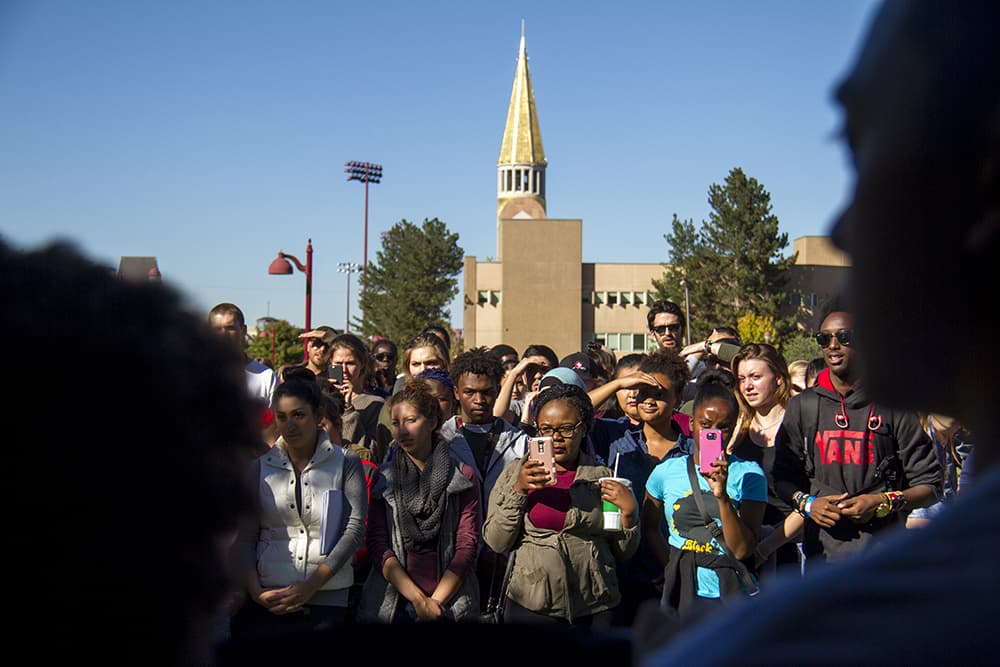
After a string of "hurtful" race-related messages, the University of Denver's student government is temporarily covering the school's freedom of speech wall.
A recent message on the wall read, “White People. Do Something. — #BlackLivesMatter.” Then someone crossed out "white" and "black."
Another quoted the lyrics, “I’m sorry for something I didn’t do — Lynched somebody but I didn’t know who." Under that, someone wrote, “Guilty of being white. Guilty of being right."
DU's student government wants to create guidelines for the wall and move the conversation about race to "a place where we can see our humanity and engage our community more authentically." An all-campus meeting is set for Tuesday evening, according to an email sent Friday.
In the email, student government said they asked DU administration to cover the wall for the weekend.
"Since it is the student's wall, the university will follow their request," DU spokesman Jon Stone told Denverite.
The freedom of speech wall was created about two years ago and sits on campus on the north end of the Driscoll Student Center.
"Students requested it as a way to express themselves," Stone said. "The wall is controlled entirely by students and none of the messages that go on the wall are created or erased by the university."
The original Black Lives Matter message was intended to raise awareness about black lives systematically and intentionally being targeted for demise in the United States. It's revision caused students "hurt and pain" and prompted responses both from DU's student government and chancellor.

The messages on the wall sparked about 200 students to protest race issues Friday afternoon. Sophomore Ontario Duley helped lead the rally and said the crossing out of "white" and "black" wasn't the core issue.
"This is a free speech wall, and we understand that's something that can happen," Duley said. "But the reason we feel it's necessary to come together as a community and have healing is because after the defacement of the wall someone used charged words such as 'lynched.'"
"The student (who wrote that) chose to act in an unproductive way that upset all students on campus, not just students of color," he said.
DU had 11,797 students enrolled last year. Twenty-one percent of undergrads and 19 percent of graduate students were students of color, according to the university. Three percent of them were black, or 402 students.
Last week, student government sent the entire campus a message about the initial Black Lives Matter message.
"It is not hard to see that there was an inherent disrespect when one of our own decided to cross out '#BlackLivesMatter' and 'White People. Do Something.' on the wall," states an email signed by DU student President Tess Greenwald and Vice President Chandler Carlson.
The email the student leaders sent to their peers Sept. 30 — three days after the message was defaced — goes on to say, "It only takes a few minutes of research and reaching out to our peers to find the alarming rates of inequities for people of color in our country and the rest of the world."
The wall isn't the first time a Black Lives Matter message has been defaced in Denver. Last year, someone threw paint on a sign at the First Unitarian Society of Denver.
On the national level, the Black Lives Matter movement has been criticized for promoting negative messages about law enforcement and not being inclusive.
DU Chancellor Rebecca Chopp addressed those issues in an email she sent students Thursday.
"Supporting the Black Lives Matter movement does not make one anti-police or anti-white. Discussing and analyzing systems of oppression does not mean that all individuals of a certain group are bigots. Talking about implicit bias is meant to expand our appreciation of the complexities of the problem, not to dole out judgments," Chopp wrote.
The email was also signed by Provost and Executive Vice Chancellor Gregg Kvistad; Vice Chancellor for Campus Life and Inclusive Excellence Lili Rodriguez; and Frank Tuitt, special advisor to the chancellor and provost for diversity and inclusion.
DU freshman Matthew Campbell, who is black, said racial tension on campus hasn't really been a problem, but he was upset the original Black Lives Matter message was altered.
"For me, it was quite shocking to think that this would happen on such a beautiful campus, such a diverse campus," Campbell said. "Sometimes we just have to keep our calm, even when we don't want to, cause actions speak louder than words."
Kevin J. Beaty contributed to this report.
Business & data reporter Adrian D. Garcia can be reached via email at [email protected] or twitter.com/adriandgarcia.
Subscribe to Denverite’s newsletter here bit.ly/DailyDenverite.












